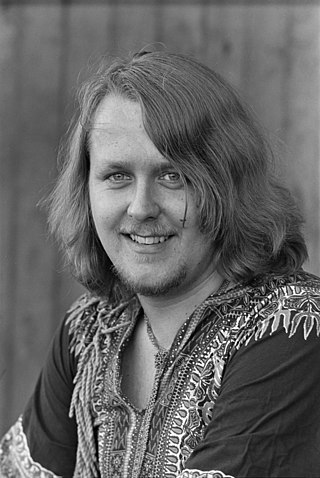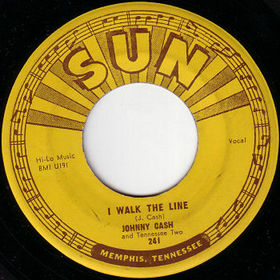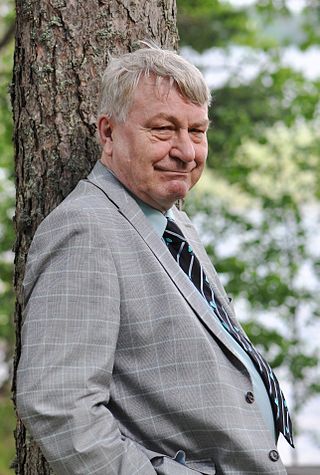This article has multiple issues. Please help improve it or discuss these issues on the talk page . (Learn how and when to remove these template messages)
|

Aarne Tapani Kansa (born 9 March 1949 in Hamina, Finland) is a Finnish singer.
This article has multiple issues. Please help improve it or discuss these issues on the talk page . (Learn how and when to remove these template messages)
|

Aarne Tapani Kansa (born 9 March 1949 in Hamina, Finland) is a Finnish singer.
Tapani Kansa made his first record deal in 1967 and had a breakthrough the next year, with his version of the hit song Delilah , translated into Finnish. Tapani Kansa had established a career in singing at a very young age. He had started studying singing in the Kotka music academy in the middle 1960s. His colourful performance style brought him much work on television. His early hit songs include Kuljen taas kotiinpäin ("I am walking home again"), Eloise and Käymme yhdessä ain ("We will always go together"). In 1976, Tapani Kansa achieved great success with his songs R-A-K-A-S ("D-E-A-R"), Hafanana and Melina. The next year he released the album Mistä rakkaus alkoi ("Where did the love start"), which presented a more pop music style Tapani Kansa: The album contains a Finnish version of Elton John's song Sorry Seems To Be The Hardest Word - in Finnish Anteeksi on vaikea pyytää ("It is hard to apologise").
The 1970s brought rock and roll and show music to Kansa's concerts. Hits of the time included Rokkivaari Hotanen ("Hotanen, the rocking grandpa", translated from Daddy Cool by Darts) and Kalajoen hiekat ("The sands of Kalajoki", translated from California Dreamin' by The Mamas & the Papas). Veikko Nieminen brought a more sociological aspect to the lyrics in connection with the new age.
Tapani Kansa also studied singing at the Sibelius Academy from 1974 to 1978, and in the late 1970s, he enlarged his repertoire: The album Moment Musical (1978) was made in co-operation with Heikki Sarmanto, who arranged a musical version of Eino Leino's lyrics into the album. Another artist on the album was Maija Hapuoja. In 1987, Kansa recorded the classic Hopeinen Kuu ("Silver Moon") and the album Betonimylläri, containing poetry by Lauri Viita. 1988 brought Oskari Merikannon kauneimmat laulut. The album Kultaniityt (1994 introduced, among some translated songs, also Tapani Kansa as a songwriter. On the album Päivä jolloin rakastat ("The day you love", 1999), Kansa interpreted Argentinian tangos, while Valaistu ikkuna ("The lit window") included Finnish film songs. The album Salaisuudessain ("In my secret", 2002) was a return to the pop music style, and a new direction came in autumn 2004, when Tapani Kansa interpreted Tapio Rautavaara's songs on the album Tapsa ja Rautavaara.
In 2002, Tapani Kansa appeared in the Pojat group formed by Danny and Markku Aro, performing hit songs by the artists from the 1960s.
In 2006, Kansa released the album Kulkumies ("The traveller"), which he wrote the lyrics to and co-arranged the melodies with Kassu Halonen. In the same year, Kansa was nominated for the Iskelmä-Finlandia prize.
Tapani Kansa has written and arranged his own works. He has also appeared on theatre and operettas and acted on TV. In 1987, Kansa was awarded the Erikois-Emma prize.
| Year | Album | Peak positions |
|---|---|---|
| FIN [1] | ||
| 1995 | Joulun rakkaimmat laulut | 22 |
| 1996 | Unessani nainen tanssii | 23 |
| 1997 | Juhlalevy | 9 |
| 1999 | Päivä jolloin rakastat | 18 |
| 2000 | Valaistu ikkuna | 27 |
| 2002 | Salaisuudessain | 20 |
| 2004 | Tapsa ja Rautavaara - lauluja elämän poluilta | 5 |
| 2007 | 40-v. juhlalevy | 24 |
| 2009 | Rakkautta on, rauhaa ei | 34 |
| 2013 | Särkyneen toiveen katu | 11 |
| 2018 | Sielunlaulu | 49 [2] |

Kaj Tapio Rautavaara was a Finnish singer (bass-baritone), athlete and film actor.

Paul Albert Anka is a Canadian-American singer, songwriter and actor. He is best known for his signature hit songs including "Diana", "Lonely Boy", "Put Your Head on My Shoulder", and "(You're) Having My Baby". Anka also wrote the theme for The Tonight Show Starring Johnny Carson; one of Tom Jones' biggest hits, "She's a Lady"; and the English lyrics to Claude François and Jacques Revaux's music for Frank Sinatra's signature song "My Way", which has been recorded by many, including Elvis Presley. He co-wrote three songs with Michael Jackson: "This Is It" "Love Never Felt So Good", and "Don't Matter to Me", which became posthumous hits for Jackson in 2009, 2014, and 2018, respectively.

In popular music, a cover version, cover song, remake, revival, or simply cover is a new performance or recording by a musician other than the original performer or composer of the song. Originally, it referred to a version of a song released around the same time as the original in order to compete with it. Now, it refers to any subsequent version performed after the original.
A roots revival is a trend which includes young performers popularizing the traditional musical styles of their ancestors. Often, roots revivals include an addition of newly composed songs with socially and politically aware lyrics, as well as a general modernization of the folk sound.

Burt Freeman Bacharach was an American composer, songwriter, record producer, and pianist who is widely regarded as one of the most important and influential figures of 20th-century popular music. Starting in the 1950s, he composed hundreds of pop songs, many in collaboration with lyricist Hal David. Bacharach's music is characterized by unusual chord progressions and time signature changes, influenced by his background in jazz, and uncommon selections of instruments for small orchestras. He arranged, conducted, and produced much of his recorded output.
The music of Finland can be roughly divided into folk music, classical and contemporary art music, and contemporary popular music.

Einojuhani Rautavaara was a Finnish composer of classical music. Among the most notable Finnish composers since Jean Sibelius (1865–1957), Rautavaara wrote a great number of works spanning various styles. These include eight symphonies, nine operas and fifteen concertos, as well as numerous vocal and chamber works. Having written early works using 12-tone serial techniques, his later music may be described as neo-romantic and mystical. His major works include his first piano concerto (1969), Cantus Arcticus (1972) and his seventh symphony, Angel of Light (1994).
A cover band is a band that plays songs recorded by someone else, sometimes mimicking the original as accurately as possible, and sometimes re-interpreting or changing the original. These remade songs are known as cover songs. New or unknown bands often find the format marketable for smaller venues, such as pubs, clubs or parks. The bands also perform at private events, for example, weddings and birthday parties, and may be known as a wedding band, party band, function band or band-for-hire. A band whose covers consist mainly of songs that were chart hits is often called a top 40 band. Some bands, however, start as cover bands, then grow to perform original material. For example, the Rolling Stones released three albums consisting primarily of covers and then recorded one with their own original material.

Heikki Veikko Harma is a Finnish singer-songwriter who has also distinguished himself as a translator of song lyrics, but has written popular lyrics of his own too. To the public he is better known by the name Hector, which he has used since the release of his 1965 debut single "Palkkasoturi", a Finnish translation of Buffy Sainte-Marie's "Universal Soldier". His 1974 album Hectorock I became the fastest-selling record in Finnish history, selling 50,000 units within a few months. Hector was at the height of his popularity in the first half of the 1970s, but his steady string of recordings provided occasional hits well into the 1990s. In the 2000s he made a strong return to popularity with Ei selityksiä, which became one of his most successful albums. In 2007 he made a farewell tour on big arenas, but has performed occasionally after that too. In 2011 he made a massive comeback tour and released a new album Hauras (Fragile) in 2014, ten years after his previous album.

Juha Harri "Junnu" Vainio, also known as Juha "Watt" Vainio was a Finnish lyricist, singer, composer and teacher. With the lyrics or music to over 2,400 songs to his name, Vainio is one of Finland's most prolific lyricists along with Sauvo Puhtila, Reino Helismaa and Vexi Salmi. Vainio enjoyed a short professional career as a teacher at Kymenranta Primary School.

Gaudete is a sacred Christmas carol, thought to have been composed in the 16th century. It was published in Piae Cantiones, a collection of Finnish/Swedish sacred songs published in 1582. No music is given for the verses, but the standard tune comes from older liturgical books.*

"I Walk the Line" is a song written and recorded in 1956 by Johnny Cash. After three attempts with moderate chart ratings, it became Cash's first #1 hit on the Billboard country chart, eventually reaching #17 on the Billboard Hot 100.
"Just a Gigolo" is a popular song, adapted by Irving Caesar into English in 1929 from the Austrian tango "Schöner Gigolo, armer Gigolo", composed in 1928 in Vienna by Leonello Casucci to lyrics written in 1924 by Julius Brammer.

Carola Christina Standertskjöld-Liemola, professionally known as Carola, was a Finnish jazz and pop singer. Her style was partially inspired by American singers of the 1950s. Simultaneously, it was in the spirit of the modal jazz scene going down in Europe in the 1960s. Mostly, Carola's jazz repertoire consisted in idiosyncratic versions of American songs in English, while her most famous jazz track "The Flame" was an original composition by Esa Pethman and the lyrics by the singer herself. As the vocalist for Esa Pethman's quartet and Hazy Osterwald's sextet in the early 1960s, Carola made fame in Finland and Sweden, and toured Poland, Czechoslovakia, and Switzerland. Her most significant recording is a session with the Heikki Sarmanto Trio from 1966, which the Finnish Music Information Centre considers among the original blueprints of Finnish jazz. Carola's recordings have been credited for the accosting tone of her contralto voice and her phrasing. The singer also co-produced the groovy approach of her supporting orchestras. In late 1960s and early 1970s, she performed in nine languages and a wide variety of styles, including chanson, schlager, Latin, rock'n'roll, and soul. After her death of Alzheimer's disease in 1997, Carola's music was revived in 2004 with two Best of albums and Carola & Heikki Sarmanto Trio reaching the Finnish charts.
Popular music in Yugoslavia includes the pop and rock music of the former SFR Yugoslavia, including all their genres and subgenres. The scene included the constituent republics: SR Slovenia, SR Croatia, SR Bosnia and Herzegovina, SR Montenegro, SR Macedonia and SR Serbia and its subunits: SAP Vojvodina and SAP Kosovo. The pop and rock scene was a part of the general Music of Yugoslavia, which also included folk, classical music, jazz etc. Within Yugoslavia and internationally, the phrases ex-YU or ex-Yugoslav Pop and Rock both formally and informally generally to the SFRY period, though in some cases also to its successor the FR Yugoslavia including Serbia and Montenegro which existed until 2006.

Paula Julia Vesala is a Finnish singer-songwriter, actress, and playwright. She was one of two singers and main lyricist in the pop rock duo PMMP along with Mira Luoti. Her solo career began in 2015 under the stage name "Vesala". She has composed songs for other well-known Finnish artists such as Vesa-Matti Loiri, Jenni Vartiainen, and Antti Tuisku.

Pekka Juhani "Pave" Maijanen was a Finnish musician, who worked as a singer, songwriter, bass player, keyboard player, drummer, guitarist and producer during his long career. As well as his own solo career, Maijanen was a member of The Royals, Rock'n'Roll Band, Pepe & Paradise and he was the keyboard player and producer of Dingo and the Hurriganes. Maijanen's first work as a producer was for the album Nuclear Nightclub by Wigwam.

Veikko Olavi "Vexi" Salmi was a Finnish lyricist. He wrote the lyrics to numerous popular songs for several prominent artists, including Irwin Goodman, Jari Sillanpää, and Katri Helena. His career as a lyricist began in the 1960s, and continued until his death. During his prolific career, he wrote the lyrics for over 4,000 songs, more than 2,400 of which have been recorded. In addition to song lyrics, he authored several novels and one collection of poetry. Salmi's latest work also included collaborating with Ilkka Lipsanen on a 60th anniversary album, and he also acted as a judge on a television program on music lyrics, Biisikärpänen
Urban/contemporary gospel is a modern subgenre of gospel music. Although the style developed gradually, early forms are generally dated to the 1970s, and the genre was well established by the end of the 1980s. The radio format is pitched primarily to African-Americans. Christian hip hop can be considered a subtype of this genre.
Sparven om julmorgonen is a poem by Zachris Topelius from 1859. It has been translated to Finnish by Konrad Alexis Hougberg. You can see the sorrow of Topelius in the poem; his son, Rafael, died at the age of one the spring before he wrote the poem.